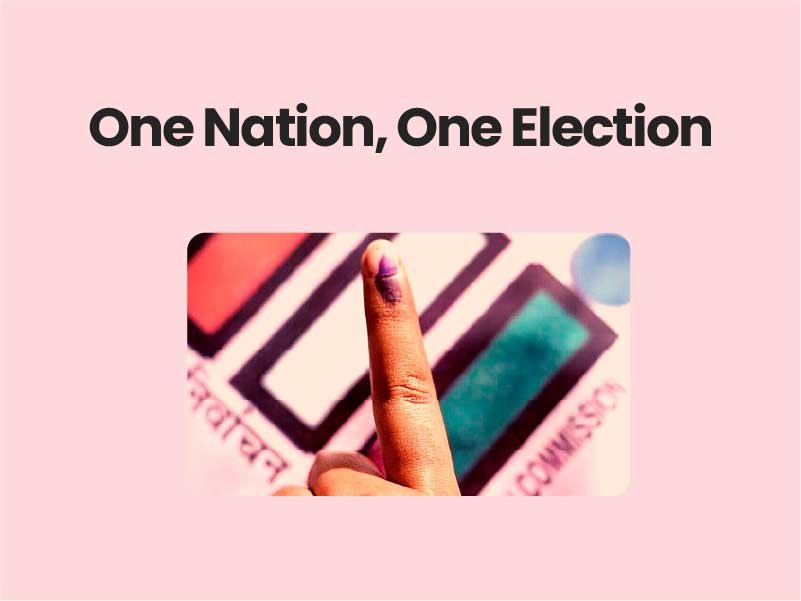
One Nation, One Election
The Law Commission submitted a draft report to the government on August 30, 2018, endorsing the proposal. It even recommended changes to the Constitution and the electoral law so as to enable holding simultaneous polls.
Simultaneous polls:
- Currently, elections to the state assemblies and the Lok Sabha are held separately — that is whenever the incumbent government’s five-year term ends or whenever it is dissolved due to various reasons.
- This applies to both the state legislatures and the Lok Sabha. The terms of Legislative Assemblies and the Lok Sabha may not synchronise with one another.
- For instance, Rajasthan faced elections in late 2018, whereas Tamil Nadu will go to elections only in 2021.
- The idea of “One Nation, One Election” envisages a system where elections to all states and the Lok Sabha will have to be held simultaneously.
- This will involve the restructuring of the Indian election cycle in a manner that elections to the states and the centre synchronise.
- This would mean that the voters will cast their vote for electing members of the LS and the state assemblies on a single day, at the same time (or in a phased manner as the case may be).
What is the background?
- Post adoption of the Constitution, the elections to Lok Sabha and all State Legislative Assemblies were held simultaneously between 1951 till 1967 when the cycle of synchronized elections got disrupted.
- The first general elections to Lok Sabha and all State Legislative Assemblies were held together in 1951-52. That practice continued over three subsequent general elections held in the years- 1957, 1962 and 1967.
- However, due to the premature dissolution of some Legislative Assemblies in 1968 and 1969, the cycle got disrupted for the first time.
- In1970, Fourth Lok Sabha was itself dissolved prematurely and fresh elections held in 1971. Thus, First, Second and Third Lok Sabha enjoyed full five year terms.
- The term of Fifth Lok Sabha was extended till 1977 under Article 352. After that, the Eighth, Tenth, Fourteenth and Fifteenth Lok Sabha could complete their full five year terms.
- Sixth, Seventh, Ninth, Eleventh, Twelfth and Thirteenth Lok Sabha was dissolved prematurely.
- Various State Assemblies also faced similar issues over a period of time. As a result of all such premature dissolutions and extension, the cycle of simultaneous elections has been firmly disrupted
The issue of simultaneous elections:
- Term of House of People and State Legislative Assemblies
- Premature dissolution of Lok Sabha or State Assemblies
- Responsibility for conduct of elections to Lok Sabha and State Legislative Assemblies
- Frequent elections disrupt normal public life
- Frequent elections perpetuate caste, religion and communal issues across the country
- Frequent elections adversely impact the focus of governance and policy making
Challenges:
- Operational feasibility / Do-ability
- Impact to voter behavior
- Having to face electorate more than once every 5 year enhances the accountability of politicians and keeps them on their toes and
- Many jobs are created during elections, boosting the economy at the grass-root levels”.
One nation one election – advantages
- Simultaneous polls will reduce enormous costs involved in separate elections.
- The system will help ruling parties focus on governance instead of being constantly in election mode.
- Simultaneous polls will boost voter turnout, according to the Law Commission.
Conclusion:
- Elections impact everyone in the entire country – citizens, businesses, administrative machinery, constitutional institutions, political parties, leaders and so on.
- Eventual implementation of this measure would not only require significant Constitutional and Statutory amendments, it would also require significant consensus amongst the key stakeholders. Without a general consensus and wider acceptance, its intent and efficacy could be compromised.
- The Constitution does provide sufficient room to make amendments to suit the changing times and needs of the country.
- This flexibility is not just an enabling tool but in fact a responsibility on Governments to provide the best governance systems, processes and opportunities to its citizens.
- As a way forward, it is therefore suggested that a focused group of stakeholders comprising constitution and subject matter experts, think tanks, government officials and representatives of various political parties come together and work out appropriate implementation related details.
- This may include drafting appropriate constitution and statutory amendments, agreeing on a workable framework to facilitate transition to simultaneous elections, developing a stakeholder communication plan etc.
- As is the case with long-term structural reforms, implementing this measure would also cause some short-term pain. However, this would be a stepping stone towards improved governance and a larger initiation of “electoral reforms” – a desperately needed measure to reboot the Indian polity.
Enroll today with the best civils service academy and take your first step towards your Civils journey.
Feel free to reach out to us for any inquiries, collaborations, or support. We’re here to help.

